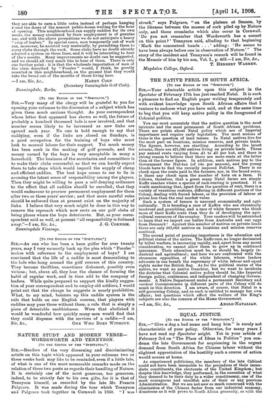THE NATIVE PERIL IN SOUTH AFRICA.
[To THE EDITOR OF TEE "SPECTATOR."] SIR,—Your admirable article upon this subject in the Spectator of February 17th has just reached Natal. It is such a pleasure to find an English paper writing temperately and with evident knowledge upon South African affairs that I venture to endorse what you have said, and at the same time to beg that you will keep native policy in the foreground of
Colonial politics.
You say most accurately that the native question is the most intricate and the most permanent of South African problems. There are points about Natal policy which are of Imperial importance and require early legislation. The most serious of these is the question of land tenure. In Natal natives live for the most part on locations, mission reserves, and private lands. The figures, however, are startling. According to the latest returns, there are 421,080 natives living on private lands. These pay annual rents varying from £1 to 45 per hut, and there is strong reason to believe that there are more rents at the latter than at the former figure. In addition, such natives pay to the Government the Hut-tax (of 14s. per annum), and the young bloods have to find the recently imposed Poll-tax. There is no cheek upon the rents paid to the farmers, nor, in the broad sense, is there any check upon the number of huts on a farm. It follows, therefore, that a great many Natal farms are simply Kaffir ranches where a species of rack-renting is practised. It is worth mentioning that, apart from the question of rent, there is a variety of vexatious customs, differing in different portions of the Colony, dealing with forced labour, or the provision of labour at prices less than the real market value.
Such a system of tenure is unsound economically and agri- culturally. It is breeding a race of Kaffirs who are chronically insolvent and grumbling, and a race of white farmers who think more of their Kaffir rents than they do of developing the agri- cultural resources of the country. Your readers will be astonished to learn that we import our batter from Australia and our eggs from Denmark ! Against this number of natives on private lands there are only 265,063 natives on locations and mission reserves
combined.
The second point of pressing importance is the education and political status of the native. The Kaffir race, no longer decimated by tribal warfare, is increasing rapidly, and, apart from any moral consideration, we cannot allow them to grow up in continued ignorance. Their education must be, or should be, largely in- dustrial and agricultural; and here we are confronted with the strenuous opposition of the white labourer, whose leaders advocate in one breath the supremacy of white labour and equal rights under the British flag. As for the political status of the native, we want no native franchise, but we want to inculcate the doctrine that Colonial native policy should be, like Imperial foreign policy, continuous, and independent of changing Govern- ments. A Native Department under a permanent Secretary and resident Commissioners in different parts of the Colony will do much in this direction. I am aware, of course, that Natal is a self-governing Colony, and as such is entitled to manage her own affairs ; but questions which affect the welfare of the King's subjects are also the concern of the Home Government.






































 Previous page
Previous page